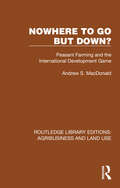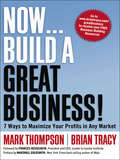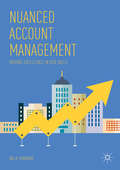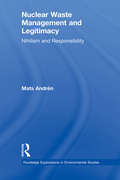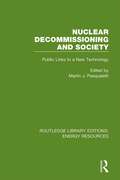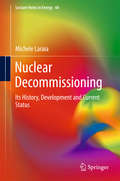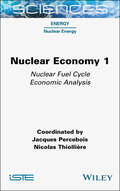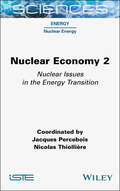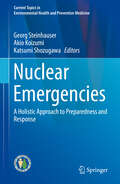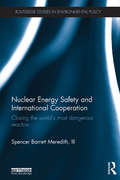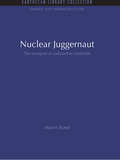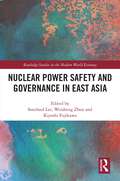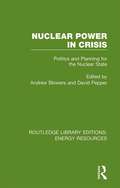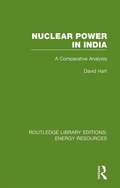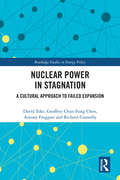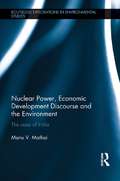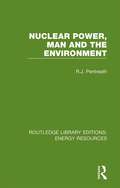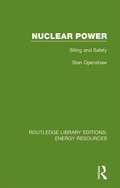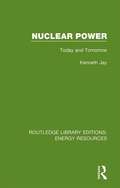- Table View
- List View
Nowhere To Go But Down?: Peasant Farming and the International Development Game (Routledge Library Editions: Agribusiness and Land Use #17)
by Andrew S. MacDonaldOriginally published in 1989, this book is a unique examination of subsistence farming in the developing world, and its potential for development. The author writes from the conviction that the farming system is limited in its potential for development by the energy value of manpower and that unless the plight of developing world communities is understood and the importance of manpower constraint recognized, inputs of development funds will be wasted. Clarifying the strengths and limitations of the subsistence farming system, the book makes clear the complexities and difficulties encountered in achieving agricultural development in the poorest countries – providing an informed insight into the inevitability of future famine.
Now . . . Build a Great Business!: 7 Ways to Maximize Your Profits in Any Market
by Brian Tracy Mark "Sauce ThompsonDon&’t be daunted by a challenging economy and fierce competition. Even in the toughest environment, innovative, highly profitable businesses abound and yours can be one of them.Bestselling business authority Mark Thompson and international success expert Brian Tracy join forces to show you how great leadership, great people, and great products are the key to building a phenomenally successful business.In Now, Build a Great Business!, you&’ll learn how to:inspire superior results from everyone around you;attract and keep great people;develop a business plan that maximizes your resources;identify market demands;deliver superior customer service;craft a standout marketing plan;and motivate customers to buy again and again.Thompson and Tracy reveal a series of seven principles guaranteed to improve any business in any industry. This guide also features real-world examples from wildly successful businesses and accessible, all-encompassing strategies to guide you through the most important facets of any profitable venture--including leadership, sales, and marketing.Now, Build a Great Business! will transform your business and help you deliver extraordinary results.
NuScale - Commercializing the first small modular reactor in the world
by Richard H.K. Vietor Jurgen WeissCase
NuScale Power-the Future of Small Modular Reactors
by Richard H.K. VietorNuScale Power, an entrepreneurial venture in Portland, Oregon, has designed the leading modular nuclear reactor in the United States. This Reactor will be safest and simplest ever built. Started in 2007 as an entrepreneurial venture, the company is now two years away from applying to the Nuclear Regulatory Commission for a License certification. While the NRC considers their application, the company will finish designing a nuclear plant to use 12 of their modular reactors. If the company can mitigate the substantial risks facing it, 2021 will see their first of several hundred planned sales.
Nuanced Account Management: Driving Excellence In B2b Sales
by Bala ShankarThis book is a comprehensive practical guide for account managers, sales teams and account leaders operating in the B2B space. It provides knowledge to excel in developing, growing and retaining top accounts in local and global environments. With a nuanced version of ‘account management’ that will potentially be a game changer, the book offers a personnel-and-process based agenda that can create a ‘competitive advantage’ on its own.
Nubank: Democratizing Financial Services
by Michael Chu Carla Larangeira Pedro Levindo"Nubank, a wholly-digital solution created to disrupt Brazilian banking, with 6 million clients and a $4 billion valuation after five years, must decide whether to expand to Mexico. The company was founded in S o Paulo in 2013 by Colombian-born David V lez to seize what he saw as the opportunity latent in a banking system long dominated by five large incumbents with what he considered low value products and deficient customer service. The answer for V lez was through technology. Backed by foreign venture capitalists and recruiting a top team, V lez launched a credit card available solely through a smartphone app, with quick approval and no annual fee, with credit and payments totally online and transparent, friendly customer service, completely up-ending the traditional terms of the market. Nubank's credit card became viral among the Brazilian urban middle-class and by the end of 2018, the company was the fifth credit card issuer in Brazil with over 6 million cardholders. A second product, a digital banking account, also changed market terms by offering services at no fees and yielding higher interest rates. By 2018, Nubank had $628.8 million in deposits. With success, a multitude of opportunities were now open and Nubank and its board must define strategic priorities. Within Brazil, Nubank's market share was still minor compared to the incumbents, and there were many other financial products that could be launched. In addition, 30% of Brazilians remained unbanked. Yet V lez and his team were convinced that the whole of Latin America had the same banking pain points as Brazil and was ripe for Nubank products. For V lez, the gateway to unlocking that potential was through Mexico.
Nuclear Waste Management and Legitimacy: Nihilism and Responsibility (Routledge Explorations in Environmental Studies)
by Mats AndrénNuclear technology places special demands on society and both nuclear weapons and nuclear energy for peaceful purposes require a large measure of security and monitoring at the international level. This book focuses on nuclear waste management, which can work in democratic countries only if viewed as legitimate by the population. This book posits the inability of democracies to establish such legitimacy as an explanation for the current absence of public policy decisions that can identify a solution. The problems are such that they can be resolved only if fundamental aspects of the modern notion of legitimacy are set aside.
Nuclear Decommissioning and Society: Public Links to a New Technology (Routledge Library Editions: Energy Resources)
by Martin J. PasqualettiOriginally published in 1990. This book argues that a better understanding of the social impact of decommissioning - in areas such as jobs, waste, economics, opinion, law, public policy, land-use and legacies - is vital to the successful application of any technical solution. The issues raised are divided into three areas which deal with those problems that have already been recognized, the questions that decommissioning itself will raise and those that may result from likely future developments. The book aims to initiate a process of appraisal by examining several of the more obvious social ties to decommissioning.
Nuclear Decommissioning: Planning, Execution And International Experience (Woodhead Publishing Series In Energy Ser.)
by Michele LaraiaThis book discusses the history of nuclear decommissioning as a science and industry. It explores the early, little-known period when the term “decommissioning” was not used in the nuclear context and the end-of-life operations of a nuclear facility were a low priority. It then describes the subsequent period when decommissioning was recognized as a separate phase of the nuclear lifecycle, before bringing readers up to date with today’s state of the art.The author addresses decommissioning as a mature industry in an era in which large, commercial nuclear reactors and other fuel-cycle installations have been fully dismantled, and their sites returned to other uses. The book also looks at the birth, growth and maturity of decommissioning, focusing on how new issues emerged, how these were gradually addressed, and the lessons learned from them. Further, it examines the technologies and management advances in science and industry that followed these solutions. Nuclear Decommissioning is a point of reference for industry researchers and decommissioning practitioners looking to enrich their knowledge of decommissioning in recent decades as well as the modern industry. The book is also of interest to historians and students who wish to learn more about the history of nuclear decommissioning.
Nuclear Economy 1: Nuclear Fuel Cycle Economic Analysis
by Jacques Percebois Nicolas ThiollièreThis book presents the factual, precise, complete and accessible economic elements of nuclear energy in order to contribute to an informed and dispassionate debate. It begins with an in-depth analysis of the strategic policies relating to nuclear energy in France and around the world. The methodological aspects are presented exhaustively and illustrated with detailed examples and case studies. This book provides a relevant economic study of the fuel component of nuclear energy. In this context, aspects of the uranium market are presented, before describing in detail the technical and economic components upstream of the nuclear cycle.
Nuclear Economy 2: Nuclear Issues in the Energy Transition
by Jacques Percebois Nicolas ThiollièreThis book presents the factual, precise, complete and accessible economic elements of nuclear energy in order to contribute to an informed and dispassionate debate. It analyzes the economic aspects of spent fuel management, including the costs and financing of long-term storage and deep geological disposal. The economic costs of a nuclear accident are also discussed from both theoretical and applied angles, based on the Fukushima nuclear disaster. Nuclear Economy 2 also examines the industrial and political aspects of the future energy mix. Nuclear energy is thus placed in the more global context of the European electricity market. Finally, this book offers a panorama of energy scenarios on the scale of France, but also of the world.
Nuclear Emergencies: A Holistic Approach to Preparedness and Response (Current Topics in Environmental Health and Preventive Medicine)
by Akio Koizumi Georg Steinhauser Katsumi ShozugawaThis book discusses nuclear events that may become imminent threats to the fabric of our society, and elucidates strategies for preventing these threats or mitigating their adverse effects. It addresses multidisciplinary aspects of various nuclear emergencies, including nuclear accidents, terror attacks involving nuclear materials, illicit trafficking of nuclear materials, and problems related to nuclear forensics and strikes with nuclear weapons/warheads. Very often, nuclear emergencies are only discussed within certain, specific communities. However, this volume brings together experts from various fields to provide a more holistic approach to the problem. Physical, chemical, environmental, social, and medical scientists, together with representatives from the media and authorities, present their views on and strategies for events that cause fear and anxiety among the public – an aspect that can be even more threatening than the direct health effects. The book offers a valuable guide for nuclear scientists, such as radioecologists, health physicists, radioanalytical scientists and nuclear engineers, as well as decision-makers and national/international authorities.
Nuclear Energy Development in Asia
by Xu Yi-ChongAn exploration of how and why Japan, South Korea, Taiwan, China and India have initiated and developed nuclear energy programs and what challenges they face today. Were the nuclear programmes driven by the low energy endowment, a desire to pursue international prestige, national security concerns, environmental pollution or economic development?
Nuclear Energy Safety and International Cooperation: Closing the World's Most Dangerous Reactors (Routledge Studies in Environmental Policy)
by Spencer Barrett Meredith, IIITwenty-five years after the Chernobyl explosion, disaster struck once again after a tsunami overwhelmed the considerable safety measures at the Fukushima nuclear power plant in Japan. However, Fukushima had in place a solid containment structure to reduce the spread of radiation in the event of a worst-case scenario; Chernobyl did not. These two incidents highlight the importance of such safety measures, which were critically lacking in an entire class of Soviet-designed reactors. This book examines why five countries operating these dangerous reactors first signed international agreements to close them within a few years, then instead delayed for almost two decades. It looks at how political decision makers weighed the enormous short-term costs of closing those reactors against the long-term benefits of compliance, and how the political instability that dominated post-Communist transitions impacted their choices. The book questions the efficacy of Western governments’ efforts to convince their Eastern counterparts of the dangers they faced, and establishes a causal relationship between political stability and compliance behavior. This model will also enable more effective assistance policies in similar situations of political change where decision makers face considerable short-term costs to gain greater future rewards. This book provides a valuable resource for postgraduate students, academics and policy makers in the fields of nuclear safety, international agreements, and democratization.
Nuclear Energy: An Answer to Climate Change?
by James Weber Michael W. Toffel Glen W. S. DowellEnvironmental activist groups have traditionally opposed nuclear energy. However, the growing environmental problems associated with global climate change requires major changes to reduce the carbon intensity of electricity generation. Should environmental groups reverse course and support the construction of new nuclear plants--using technology that could be rapidly deployed at scale--to reduce greenhouse gas emissions that are causing global climate change?
Nuclear Energy: An Answer to Climate Change?
by James Weber Michael W. Toffel Glen W. S. DowellEnvironmental activist groups have traditionally opposed nuclear energy. However, the growing environmental problems associated with global climate change requires major changes to reduce the carbon intensity of electricity generation. Should environmental groups reverse course and support the construction of new nuclear plants--using technology that could be rapidly deployed at scale--to reduce greenhouse gas emissions that are causing global climate change?
Nuclear Juggernaut: The transport of radioactive materials (Energy and Infrastructure Set)
by Martin BondEvery day throughout Britain, by road, by rail and by sea, there are large numbers of routine movements of radioactive cargo. Materials at all stages of the nuclear cycle, from uranium ore to nuclear waste, from nuclear warheads to radioactive isotopes used in medicine, are constantly on the move. In normal circumstances handling low-level material exposes workers to small doses of radiation, but a serious accident could lead to widespread contamination and to the major risk of additional deaths from cancer. The accident record is not good. There are repeated small accidents and many people believe that the major accident is simply waiting to happen. This book gives a thorough account of what is moved, by wham and far what purpose. It considers the risks, including that of terrorism, the safety record and the precautions. It also highlights the perils of the secrecy surrounding the industry: for example, local councils are responsible for coping with any accident, but are not told when or where nuclear movements are taking place. Martin Bond's careful work is a large step towards order in a chaotic industry. Originally published in 1992
Nuclear Power Safety and Governance in East Asia (Routledge Studies in the Modern World Economy)
by Soocheol Lee Kiyoshi Fujikawa Weisheng ZhouConfronting the challenges of nuclear power governance, this book provides pathways to nuclear safety cooperation between countries in East Asia where regional cooperation is challenged by geopolitical tensions. The book is split into three parts: first looking at nuclear risk and safety communications, second on nuclear policy and harmonization of safety standards, and third a comparative analysis of nuclear regulatory agencies in East Asia. Taken as a whole, the contributors recommend the establishment of a nuclear safety system that, which allows for mutual verification of safety standards at the regional level, and a regulatory framework with international credibility, which will help standardize risk communication. They suggest that the exchange of experiences involving nuclear power plant safety, efforts toward common safety standards, safety management, and collaborative efforts between Japan, China, and South Korea are extremely urgent issues. By comparing the European system of nuclear governance with that of East Asia, the book highlights the need for nuclear safety organizations in East Asia to strengthen interconnections and build regional linkages. This book will be of interest to policymakers, academics, and researchers in the field of energy policy, energy economics, nuclear safety, nuclear governance, and nuclear engineering.
Nuclear Power in Crisis: Politics and Planning for the Nuclear State (Routledge Library Editions: Energy Resources)
by David Pepper Andrew BlowersOriginally published in 1987. The Chernobyl disaster intensified the whole debate on the nuclear power industry. There was great public concern about the industry regulation, about the siting of nuclear facilities, including the dumping of nuclear waste, and about the alleged secretiveness of the industry. This book examines these and many other important aspects of the industry worldwide and provides much important original research. It focuses in particular on the political processes which control the industry, on waste disposal and on the social impact.
Nuclear Power in India: A Comparative Analysis (Routledge Library Editions: Energy Resources)
by David HartOriginally published in 1983. The Indian nuclear power programme, both the earliest in the Third World and also one of the most comprehensive, is an important and instructive subject for a wide-ranging and detailed study. This book examines the origins and rationale of the Indian programme in the context of energy resources and consumption. It traces the progress of its historical development and leads up to an evaluation of its performance, in both technical and economic terms of both individual reactors and the programme as a whole. In addition, the book discusses India's nuclear explosion of 1974 and the possibilities for novel developments in nuclear power and other energy sources, such as coal, biogas, hydro and solar power. The author then sets the Indian programme into the world picture by comparing developments in India with those of the Third World (including developments in China and South Africa) and discusses the overall prospects for the Third World. This extremely informative account will appeal to readers with interest in energy, science, technology and Third World developments.
Nuclear Power in Stagnation: A Cultural Approach to Failed Expansion (Routledge Studies in Energy Policy)
by David Toke Richard Connolly Geoffrey Chun-Fung Chen Antony FroggattThis book studies the extent to which nuclear safety issues have contributed towards the stagnation of nuclear power development around the world, and accounts for differences in safety regulations in different countries. In order to understand why nuclear development has not met widespread expectations, this book focusses on six key countries with active nuclear power programmes: the USA, China, France, South Korea, the UK, and Russia. The authors integrate cultural theory and theory of regulation, and examine the links between pressures of cultural bias on regulatory outcomes and political pressures which have led to increased safety requirements and subsequent economic costs. They discover that although nuclear safety is an important upward driver of costs in the nuclear power industry, this is influenced by the inherent need to control potentially dangerous reactions rather than stricter nuclear safety standards. The findings reveal that differences in the strictness of nuclear safety regulations between different countries can be understood by understanding differences in cultural contexts and the changes in this over time. This book will be of great interest to students, scholars, and policymakers working on energy policy and regulation, environmental politics and policy, and environment and sustainability more generally.
Nuclear Power, Economic Development Discourse and the Environment: The Case of India (Routledge Explorations in Environmental Studies)
by Manu V. MathaiNuclear power is often characterized as a "green technology." Technologies are rarely, if ever, socially isolated artefacts. Instead, they materially represent an embodiment of values and priorities. Nuclear power is no different. It is a product of a particular political economy and the question is whether that political economy can helpfully engage with the challenge of addressing the environmental crisis on a finite, inequitable and shared planet. For developing countries like India, who are presently making infrastructure investments which will have long legacies, it is imperative that these investments wrestle with such questions and prove themselves capable of sufficiency, greater equality and inclusiveness. This book offers a critique of civilian nuclear power as a green energy strategy for India and develops and proposes an alternative "synergy for sustainability." It situates nuclear power as a socio-technical infrastructure embodying a particular development discourse and practice of energy and economic development. The book reveals the political economy of this arrangement and examines the latter’s ability to respond to the environmental crisis. Manu V. Mathai argues that the existing overwhelmingly growth-focused, highly technology-centric approach for organizing economic activity is unsustainable and needs to be reformed. Within this imperative for change, nuclear power in India is found to be and is characterized as an "authoritarian technology." Based on this political economy critique the book proposes an alternative, a synergy of ideas from the fields of development economics, energy planning and science, technology and society studies.
Nuclear Power, Man and the Environment (Routledge Library Editions: Energy Resources #No. 51)
by R. J. PentreathOriginally published in 1980. A clear understanding of how radioactivity moves through the environment is essential to discussions on nuclear power. This book describes, in didactic rather than polemic style, the nature of radioactivity, how it arises in the day-to-day running of nuclear reactors, how and why a small fraction is introduced into the environment in a controlled manner, and on what basis judgements on these processes should be made.
Nuclear Power: Siting and Safety (Routledge Library Editions: Energy Resources)
by Stan OpenshawOriginally published in 1986. Nuclear power is now regarded as essential to survival in the twenty-first century. But the safety of nuclear power stations is a highly controversial topic, and where they will be sited is a most vital question. In this independent critique, based on four years of research, Stan Openshaw argues that reactor siting provides a simple means of offering additional, design-independent margins of safety. Reactor siting policies in the UK and USA are examined and it is suggested that UK siting practices need to be updated. The large number of potential alternative sites should be used to devise new planning strategies – strategies which will minimise both the residual health risks from accidents and the danger that a future change in public opinion might lead to calls for the closure of many existing sites on safety grounds.
Nuclear Power: Today and Tomorrow (Routledge Library Editions: Energy Resources)
by Kenneth JayOriginally published in 1961. This book gives the layman a better understanding of the nature of nuclear power and explains some of the major problems which have to be overcome in making practical use of it. It is concerned mainly with the different kinds of nuclear reactors - their underlying principles are explained and illustrated by reference to particular plants or design studies. Interested readers will find that the discussion of principles is full enough, and the range covered wide enough, to provide a broad view of the subject and a useful introduction to some more technical literature.
